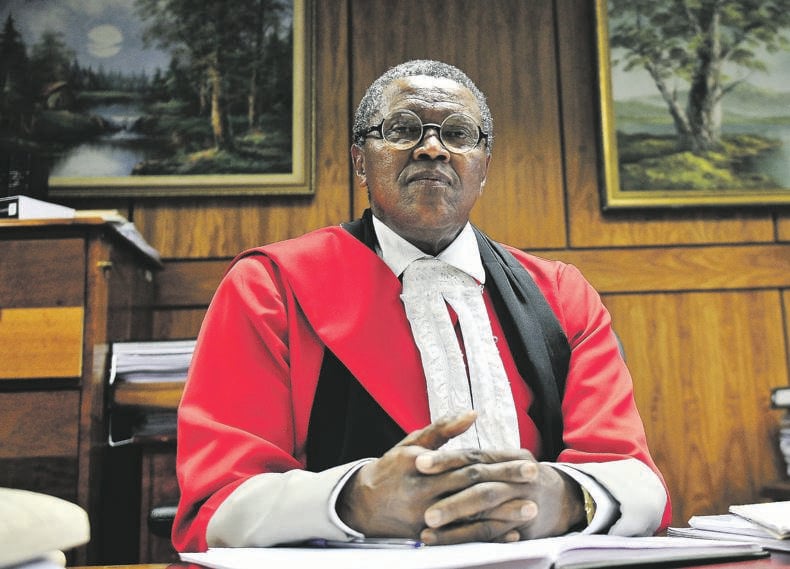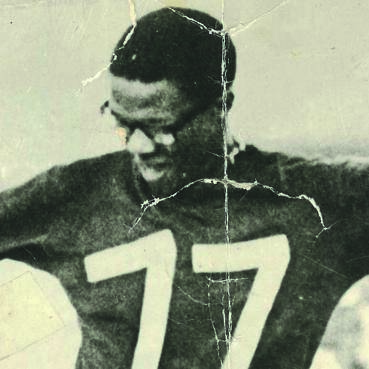
High court judge and son of Alexandra township talks to Timothy Molobi about the value of education, being part of SA football’s golden era and wearing specs on the pitch
It is etched in the memory of High Court Judge Ratha Mokgoatlheng, as it is in the memories of those lucky enough to have witnessed it.
For nobody had scored such a goal, which football great Ace Ntsoelengoe later called a “never-see”.
Nobody, except perhaps Mokgoatlheng himself, thought it possible.
Fifty-one years ago, Mokgoatlheng, now a high court judge, was right on the spot where the centre line of the field touches the border on the right-wing position.
Most of the spectators were there to witness the new South Africa football sensation Percy “Chippa” Moloi.
Yes, “Jimmy Greaves” Mokgoatlheng, then 20 years old, had also just joined the mighty Orlando Pirates, but none came bigger or more revered than Moloi.
It was 1968 and the Mohlakeng closed ground in Randfontein was packed to the rafters in the game against local giants Young Zebras.
Pirates keeper Mandy “Mannie” Davids bumped the ball twice and unleashed a huge clearance to the right wing, where Mokgoatlheng was standing.
As always, his fingers were gripping the tip of his long-sleeved jersey tightly.
Mokgoatlheng always threw his upper body this way and that to send opponents in the wrong direction, arms flailing in unison.
As the ball flew from Davids, Mokgoatlheng bent his upper body forward, almost at a right angle to his legs, facing the goalkeeper at the same time.
That ball landed bang on his right foot and left it like a rocket over the Zebras goalkeeper and into the net.
The entire ground was stunned into silence before the crowd roared its approval of a great, unmatched goal.
The timing of the flight of the ball, the accuracy, the kick and the power have yet to be seen again, I am told.
Mokgoatlheng wasn’t long at Pirates. He was expelled alongside corner-kick specialist Edward “Msomi” Khoza and Thomas “Zero My Hero” Johnson for defying team management’s orders and “being obstreperous”.
The next year, he co-founded the club that is now known as Kaizer Chiefs with Kaizer Motaung and began studying law.
Decades later, the route to room 910 in the Johannesburg High Court is almost as challenging as making an appointment to interview him.
Mokgoatlheng’s desk is packed with volumes of cases and a clerk hurriedly removes one from our eyes before we can sneak a peek.
“This case is still going to sit so you can’t record it,” she explains.
Once he’s taken off his robes, Mokgoatlheng loses his veneer of toughness.
His eyes glow when he talks about the football of yesteryear, but darken when he talks about the current state of the game and the dearth of talent in the country.
Whoever said education and sport don’t mix was clearly wrong, because as early as the 1970s, players were always taught that education and sports go together.
Mokgoatlheng had no choice but to study, growing up in an academic family in Alexandra township where his uncle was a school teacher, and later a principal and school inspector.
His father attended the same Madibane High School as the likes of Archbishop Emeritus Desmond Tutu.
“He was known as Chaucer as he admired the medieval English author and he inculcated the education culture in me,” he says.
After his family was forcibly removed from Alexandra to Diepkloof, Soweto, he also attended Madibane High for three years, where he played with the likes of Moloi.
Studying law at the University of Fort Hare was a direct result of his father’s preaching, and his admiration for Nelson Mandela and Oliver Tambo.
“I was fortunate because of our background. In African society education was the prized asset. It was the only thing we could bequeath our children. We had to have qualifications to uplift ourselves. We couldn’t participate in the economy as jobs were reserved for white people. Even the political leaders were highly qualified and that inspired us,” he says.
“For three years after matriculating I tried to go for football trials overseas. Actually, renowned veteran football journalist Sy Lerman tried to get me a trial with Manchester United, but my father insisted that I go to Fort Hare and further my studies.
“I grew up in the house of Moses Kotane, then secretary-general of the South African Communist Party. He was the patron and president of Alexandra’s Alex Gunners, and that’s how I got to know him. He inspired us to study.”
Mokgoatlheng still played for Chiefs while at university.
“I would be ‘imported’ whenever they played important matches. It was like a semi-retirement. I was also the coach there for the first team.”
Mokgoatlheng was also one of the first players to play wearing spectacles, which he says was definitely not the fashion at the time.
“I had an unfortunate incident where I had a retinal detachment when playing for Pirates. I had to undergo an operation on my right eye and I was told if I injured it again I would lose it. That’s when I started playing with contact lenses, and I think I was the first African footballer to do so. Later I played with spectacles.”
During his career, South African football was constrained by the apartheid government’s racial precepts.
As a result there were four different leagues: for whites, for coloureds, for Indians and for Africans.
Mokgoatlheng clearly remembers an incident in 1969 when there was an attempt to settle the score as to which of Pirates and Highlands Park, which had only white players, was the country’s finest team.
A promoter devised a plan to pit the two teams against each other outside of South African borders, in Swaziland.
“But the then minister of Bantu affairs, MC Botha, who was also running home affairs, intervened and refused to give us passports, saying it was going to be contrary to the apartheid ideology of keeping nations apart. We would never know who was the best,” Mokgoatlheng says.
The 1960s and 1970s were the golden era of SA football.
“The talent of then cannot be matched by the current crop, I’m sorry to say that. We had the likes of Bernard “Dancing Shoes” Hartze, Chippa and Rashid Khan going for trials at Leeds United, and Kaizer going to America. Talentwise, I still have to see a player to equal Sugar Ray Xulu and Mainline Khoza,” he said.
“When we faded from the scene came Ntsoelengoe, Jomo Sono and Teenage Dladla. But in my view, we have never produced a greater player than Steve “Kalamazoo” Mokone – the best in black and white. He was the best. Mokone was peerless. He came during the height of apartheid and he conquered Italy and Holland.”
Mokgoatlheng says Mokone was an inspiration because he also went on to study after his retirement to become a professor of psychology.
“Maybe the players today are fitter than we were because of structured training and diet, but talentwise we had the best. For me the last best team we had was the 1996 team. A dearth of classy players is reflected in the performances of the national team,” he says.
Mokgoatlheng blames the administrators, saying that with the resources the country has, we should be up there with the best.
“The other aspect is the importation of third-rate coaches. The majority of them are nobodies who can’t even coach in the third division in England, yet we expect them to impart knowledge which will somehow miraculously raise our standards,” he says.
“Once we get that correct, then we will go somewhere. Maybe we should have programmes to send young coaches abroad.”
Mokgoatlheng insists that football in South Africa is still as far behind the rest of the world as it was during apartheid.
“When I was with Chiefs, I spent six weeks with Juventus in Italy, coached by Giovanni Trapattoni. Roberto Baggio was their best player. That’s when I first realised we are years and years behind. Back then they had coaches for goalkeepers, defenders and strikers – and that was in the 1980s,” he says.
“During our time, when we did road work, even the goalkeepers would join us. That’s just one of the nonsensical things in our football.”
He says today’s players could live a good life after football, but misuse the opportunities they are given.
“It’s a worldwide problem. They make too much money and think the rainy days are gone. They believe money is eternal and it is sad when you read about their plight.
“I want to inculcate in our people the notion that education is eternal. Riches are ephemeral, you can be rich and tomorrow it is gone.
Road to the Bench
After qualifying, Mokgoatlheng did his articles at Bowman Gilfillan law firm and was admitted as an attorney in 1976, while still playing for Chiefs.
“It was difficult when I trained as an attorney during the apartheid years because there was a quota. The system didn’t want an influx of blacks and encouraged us to go to the homelands. It was also difficult to obtain articles because white firms didn’t want to take blacks as competitors,” he says.
“There was resistance, even on the Bench.”
After 30 years in practice, he was appointed as an acting judge in 2002 and, four years later, to a full-time position on the Bench.
He says he learnt the ropes from Chief Justice Mogoeng Mogoeng and his deputy, Judge Raymond Zondo.
Working in arguably the busiest court in the southern hemisphere, Mokgoatlheng admits it’s a stressful job.
“A few months ago we had a judge visiting us from the US and he was shocked at the extent of our rolls,” he says.
“When judges retire, in the main, within three to five years they are dead. You are finished when you retire. When you retire you think you are going to rest, but you are going to die.”
On a normal day he oversees about 20 unopposed motions.
Mokgoatlheng, who has a wife and two children, says although his case load is too heavy, he enjoys his job and won’t swap it for anything, saying: “I think I am making a great contribution to society.”
But it’s been a struggle being recognised as a black judge.
“Because of the dichotomy of our country, black judges are not equal to their white counterparts. When we got on to the Bench then, the first judge president was Judge Bernard Ngoepe and it was difficult for others to accept being led by a black judge. We had to prove ourselves and I think we have acquitted ourselves well.”
Whenever he convicts a criminal to a prison term he always says: “Come back a better person.
“Passing judgment is the most difficult aspect of judicial work. When it comes to delivering a verdict, a person comes short of expectations and it’s obvious you can’t please all the parties.
“It’s a difficult equilibrium you must attain. The human empathy in you is there, although the law says the person has transgressed the laws of society.”
As we bid Mokgoatlheng farewell, he looks at the stack of page transcripts that he needs to read before compiling his judgment, the spectacles on his face as round as the ball he used to hoof into the goal.
 |
| ||||||||||||
| |||||||||||||




 Publications
Publications
 Partners
Partners











